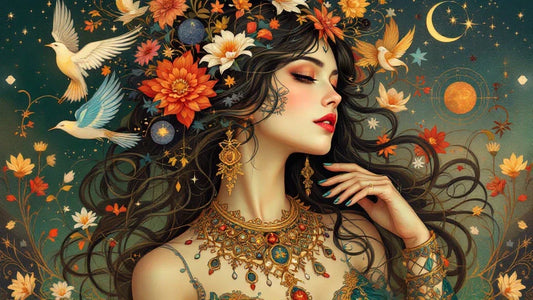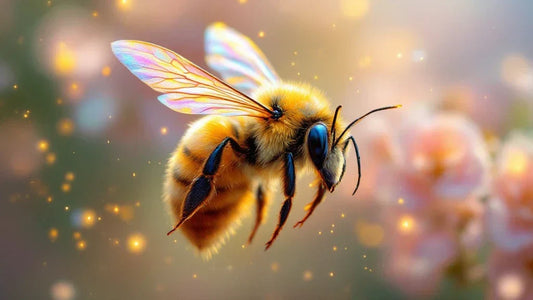
Bee Symbolism – What Do Bees Represent Spiritually & Culturally?
Share
Bee symbolism represents hard work, unity, spiritual transformation, and divine wisdom. Across cultures and throughout history, bees have embodied themes of resilience, prosperity, cooperation, and sacred connection to the natural world.
In Ancient Egypt, they were believed to be born from the tears of the sun god Ra, acting as messengers between the heavens and the earth.
In Celtic traditions, bees were seen as mystical spirit guides, bridging the world of the living and the dead. From mythology to modern spirituality, these small yet extraordinary creatures have carried deep meaning—shaping myths, religions, and folklore.
This article explores bees' cultural, spiritual, and psychological meanings, uncovers their presence in historical and contemporary jewellery, and examines their role in today’s world. From the scientific reasons behind their industrious nature to the distinct symbolism of different types of bees, discover why these creatures have captivated people for thousands of years.
What do bees symbolize today? Their significance continues to evolve. In spiritual traditions, bees represent personal transformation, prosperity, and resilience. In environmental symbolism, they remind us of nature’s delicate balance and the urgent need for conservation.

Jump to Sections:
- The Cultural Symbolism of Bees Across History
- Ancient Egypt – Bees as Divine Messengers & Symbols of Royalty
- Greek & Roman Mythology – Bees as Sacred to the Gods
- Celtic & Norse Traditions – Bees as Spirit Messengers
- Bees in Christianity – Symbols of Purity, Resurrection & Wisdom
- Hinduism, Islam & Other Religious Symbolism of Bees
- The Science Behind Bee Behaviour & Its Symbolism
- The Symbolism of Different Types of Bees
- Comparing Bee Symbolism Across Cultures
- Conclusion
- FAQ – Frequently Asked Questions (FAQs) About Bee Symbolism
- Related Symbolism & Further Reading
Bee Symbolism in Ancient Cultures: Spiritual & Historical Meaning
Bee symbolism has deep roots in history, shaped by spiritual beliefs, mythology, and nature itself. Across ancient cultures, bees represented divine order, wisdom, and prosperity—thanks to their structured societies and life-giving role in pollination.
Their symbolism was often spiritual: bees were seen as messengers between worlds, guides of the soul, and symbols of transformation and protection. From ancient empires to tribal traditions, bees have appeared in royal insignias, sacred texts, and ceremonial jewellery—acting as powerful talismans of abundance, cooperation, and spiritual insight.
Bee Symbolism in Ancient Egypt – Divine Messengers & Royal Power
In Ancient Egyptian mythology, bee symbolism was deeply spiritual. Bees were believed to emerge from the tears of the sun god Ra, falling to Earth as divine messengers between the gods and humanity. Their sacred origin linked them to themes of wisdom, spiritual guidance, and immortality.

In hieroglyphics, the bee symbolized royalty and cosmic order. Pharaohs were often titled “The Bee King,” emphasising their divine right to rule and their role in preserving Ma’at—the universal balance. Honey, revered as a sacred substance, was used in rituals, healing, and embalming, reinforcing bees' symbolic connection to protection, preservation, and the afterlife.
Greek & Roman Mythology – Bees as Sacred to the Gods
In Greek and Roman mythology, bee symbolism was deeply tied to wisdom, prophecy, and divine power. The Oracle of Delphi—one of the most sacred sites in ancient Greece—was believed to rest on the site of an ancient beehive. Priestesses known as Pythia were thought to receive messages from the gods through bees, linking them to spiritual insight and guidance.

Bees were sacred to goddesses like Artemis and Demeter, representing fertility, abundance, and the renewal of life. The Minoan Bee Pendant, one of the most iconic artefacts from Crete, symbolises unity, balance, and eternal life—central themes in bee mythology.
In Roman culture, bees were admired for their disciplined, structured societies. The honeycomb pattern appeared in armour and architecture, embodying ideals of cooperation, order, and collective strength—core elements of bee symbolism across ancient civilisations.
Celtic & Norse Traditions – Bees as Spirit Messengers
In Celtic folklore, bee symbolism was deeply spiritual. Bees were believed to act as spirit messengers, capable of travelling between the worlds of the living and the dead. The tradition of “Telling the Bees” held that births, marriages, and especially deaths had to be shared with the hive—ensuring harmony between the human and spiritual realms.
This belief highlights the bee’s symbolic connection to intuition, continuity, and sacred communication. Bees were thought to carry souls, guide the departed, and preserve balance between this world and the next.
In Norse mythology, bees were tied to wisdom and poetic inspiration. According to legend, they helped create the Mead of Poetry—a sacred drink that granted knowledge and creative power to those deemed worthy. This links bees not only to the spirit world, but also to transformation, divine favour, and higher understanding.
Bees in Christianity – Symbols of Purity, Resurrection & Wisdom
In Christian tradition, bee symbolism reflected divine wisdom, order, and spiritual purity. The beehive was seen as a metaphor for the Church—a structured and unified community built on cooperation, diligence, and purpose.
Bees also symbolised resurrection and eternal life. The hexagonal honeycomb, with its sacred geometry and perfect form, came to represent divine perfection and harmony.
Biblical references—including in Proverbs 16:24 and Judges 14—associate bees and honey with kindness, insight, and spiritual nourishment. Early Christian scholars like St. Ambrose even referred to bees as models of righteous living, highlighting their connection to wisdom and the divine order.
Hinduism, Islam & Other Religious Symbolism of Bees
In Hinduism, bee symbolism is closely tied to divine feminine energy, protection, and spiritual transformation. The goddess Bhramari, whose name means "the buzzing one," is an incarnation of Shakti, the cosmic feminine force. Bees are seen as her protectors, sent to defeat darkness and restore balance.
Honey is one of the five sacred elixirs used in rituals—known as Panchamrita—symbolising purity, nourishment, and immortality. The presence of bees in sacred rites reflects their spiritual connection to healing, rebirth, and divine order.
In Islam, bees are highly revered. The Quran includes a full chapter titled An-Nahl ("The Bee"), which describes how bees are guided by divine inspiration. Honey is praised for its healing properties, and bees are honoured as agents of balance, wisdom, and sustenance within God's creation. Their role in nature reflects the Islamic principle of harmony between life and divine will.
The Science Behind Bee Behaviour & Its Symbolism
Bees are more than insects—nature’s architects, highly organized workers, and crucial Bees are more than insects—they are nature’s architects, deeply symbolic creatures whose behaviour mirrors spiritual order, collective purpose, and divine intelligence. Their complex hive structures and cooperative work ethic have fascinated humans for centuries, helping to explain why bee symbolism is so enduring across cultures.

Bees as Symbols of Hard Work & Industry
Diligence – Their constant movement reflects persistence and disciplined effort.
Productivity – Bees work not for themselves, but to serve the hive—a model of collective good.
Purpose – Each bee’s role reinforces the belief that every individual contributes to something greater.
These qualities form the foundation of bee symbolism meaning in both spiritual and societal contexts.
The Hive as a Symbol of Order & Unity
Social harmony – A beehive reflects perfect structure and cooperation.
Loyalty & sacrifice – Bees will give their lives to protect the colony, symbolising unity and purpose.
Sacred geometry – The honeycomb’s hexagonal design represents balance, harmony, and divine mathematics.
Ancient cultures viewed the hive as a symbol of heavenly structure, echoing the spiritual meaning of bees in religious architecture and cosmology.
Bees & Intelligence: The Hidden Depths of Their Minds
Memory & learning – Bees can remember faces, locations, and adapt their behaviour.
Mathematics – They understand quantity and even the concept of zero.
Communication – Through the waggle dance, they share directions and distances—a sign of their complex intelligence.
These abilities reinforce the idea of bees as symbols of wisdom, problem-solving, and divine design.
Bees as Messengers Between Worlds
Celtic Lore – Bees carried messages between the living and the dead.
Greek Mythology – Bees guided oracles and symbolised divine prophecy.
Christian Symbolism – Their harmony represented God’s ideal of structure and unity.
Whether rooted in science or myth, bees are seen as bridges between realms—linking earth, spirit, and cosmos through their symbolic and observable traits.
Symbolism of Honey
Throughout history, honey has been more than nourishment—it’s a sacred symbol of abundance, healing, and divine reward. Created through the bee’s tireless labour, honey reflects the fruits of discipline, patience, and purpose. It represents the sweet outcome of collective effort, often appearing in rituals, sacred offerings, and spiritual texts.
In Hinduism, honey is one of the five sacred elixirs (Panchamrita), symbolising immortality and purity. In Christian tradition, it is used to signify wisdom and spiritual sweetness, referenced in scriptures like Proverbs 16:24: “Pleasant words are a honeycomb, sweet to the soul and healing to the bones.”
In modern symbolism, honey continues to reflect preservation, reward, and sacred nourishment—a reminder that transformation and abundance are earned through commitment and cooperation.
The Symbolism of Different Types of Bees
Bee symbolism varies across species, with each type of bee carrying unique spiritual and cultural meanings. While all bees represent diligence, connection, and life-giving energy, the honeybee, bumblebee, and solitary bee offer deeper layers of symbolism tied to strength, independence, and purpose.
Honeybee Symbolism – Community, Divine Order & Prosperity
The honeybee is the most recognised symbol of industry, teamwork, and spiritual wisdom. Found in ancient myths, royal emblems, and sacred texts, honeybees are associated with:
Productivity & service – Known for their tireless work in sustaining the hive.
Unity & structure – The hive represents divine balance and social harmony.
Spiritual connection – Honeybees are seen as messengers between realms, linking physical and spiritual worlds.
In modern symbolism, honeybees continue to represent abundance, order, and collective strength.
Bumblebee Symbolism – Power, Endurance & Breaking Limits
The bumblebee, larger and more solitary than the honeybee, symbolises:
Personal strength – Despite its size, the bumblebee thrives in flight, defying expectations.
Resilience – A sign of persistence in the face of obstacles.
Individual power – Often seen alone or in small groups, the bumblebee represents self-trust and inner confidence.
Spiritually, the bumblebee reminds us to trust our instincts and move forward with strength, even when the odds seem against us.
Solitary Bee Symbolism – Independence, Innovation & Self-Reliance
Solitary bees like mason bees, carpenter bees, and leafcutter bees live and work alone. They symbolise:
Independence – Thriving without a hive or collective.
Creativity & adaptability – Known for building nests in unique ways.
Inner resilience – Solitary bees reflect the strength to succeed on one’s own path.
For those seeking self-discovery and spiritual independence, solitary bees offer powerful symbolic lessons.
Modern Bee Symbolism
In modern times, bee symbolism has taken on new urgency and relevance. Beyond spiritual or cultural meaning, bees have become icons of environmental awareness, activism, and community resilience.
The global “Save the Bees” movement has made the bee a symbol of biodiversity and the fragility of ecosystems. As bee populations decline due to habitat loss, pesticides, and climate change, they now represent a warning about our planet’s health and a call to collective action.
In pop culture, bees appear in fashion, branding, and activism. The Manchester bee, adopted after the 2017 attacks, has come to symbolise unity, strength, and solidarity in the face of adversity. In celebrity culture, Beyoncé’s “Beyhive”represents loyal community and empowerment.
From protest art to tattoo designs, bees are now seen as a reminder of shared purpose, protection, and transformation—qualities more important than ever in an interconnected world.
Our 9ct Gold Bee Pendant beautifully captures this meaning in fine jewellery, combining elegance and spiritual significance.
Shop the 9ct Gold Bee Pendant →
Comparing bee symbolism across cultures
In Ancient Egypt and Greece, honeybees symbolised royalty, prophecy, and divine order.
In Celtic and Norse mythology, bees of all types were seen as spirit guides and messengers.
In Native American beliefs, the bumblebee represented endurance and balance with nature.
Across traditions—whether social or solitary—bees represent transformation, resilience, and the unseen power of small but purposeful action.
Conclusion
From ancient messengers of the gods to modern emblems of sustainability, bee symbolism continues to resonate across cultures, faiths, and philosophies. Bees embody hard work, spiritual transformation, resilience, and sacred connection—qualities that have inspired myths, rituals, and meaningful jewellery design for centuries.
Their structured hives reflect ideals of order and unity, while their tireless work reminds us of purpose, community, and harmony with nature. In a world that increasingly values connection, meaning, and sustainability, the symbolic power of bees has never been more relevant.
Whether as a symbol of spiritual growth, personal strength, or natural wisdom, the bee endures—as a small yet mighty force that continues to shape our stories, beliefs, and collective imagination.
FAQ – Frequently Asked Questions (FAQs) About Bee Symbolism
1. What do bees symbolize spiritually?
Bees symbolize hard work, unity, and spiritual guidance. They are seen as messengers between the physical and spiritual realms, representing personal transformation, resilience, and divine wisdom. Their role in pollination also connects them to growth, renewal, and abundance.
2. Are bees a sign of good luck?
Yes, bees are often seen as a sign of prosperity and good fortune. A bee entering your home or landing on you is typically considered a positive omen, symbolizing success, financial gain, or new opportunities.
3. What does it mean when a bee lands on you?
A bee landing on you is often seen as a positive spiritual sign. In many traditions, it symbolizes a message from the universe, calling for awareness, focus, or a pause for reflection. Some believe it signals upcoming change, creative energy, or a reminder to stay grounded and connected to your purpose.
4. Do bees symbolize death or the afterlife?
In some traditions, bees are seen as soul carriers or spirit messengers. The Celtic custom of “Telling the Bees” involved sharing news of a loved one’s passing with the hive, as bees were believed to carry messages between the living and the dead. They typically represent the cycle of life, renewal, and transition rather than an omen of death.
5. Why are bees associated with hard work?
Bees are admired for their diligence and teamwork, working tirelessly to maintain their hives. Their ability to pollinate, build intricate honeycombs, and sustain a colony has made them universal symbols of productivity, efficiency, and dedication.
6. What is the biblical meaning of bees?
In Christianity, bees symbolize purity, wisdom, and divine order. Early Christian scholars compared the Church to a beehive, and the honeycomb’s perfect structure is linked to eternal life and harmony, with honey representing nourishment, abundance, and spiritual enlightenment.
7. What do different types of bees symbolize?
Honeybees symbolize community, productivity, and divine wisdom. Bumblebees represent strength, persistence, and overcoming obstacles, while solitary bees reflect independence, creativity, and self-reliance. Each type carries its own unique message.
8. What does a bee tattoo represent?
A bee tattoo symbolizes strength, community, and perseverance. Popular in both spiritual and activist circles, it can reflect loyalty, collective purpose, and protection. For some, it honours the balance of hard work and reward; for others, it marks resilience and transformation after adversity.
9. What is the connection between bees and fertility?
Bees are linked to fertility and abundance due to their vital role in pollination. They were seen as bringers of life, ensuring crops flourished, while honey symbolizes creation, renewal, and prosperity.
10. How can I harness bee symbolism in my life?
You can embrace bee symbolism by wearing bee jewellery, observing bees in nature, practicing teamwork inspired by hive cooperation, and supporting bee conservation efforts.
11. What is the historical significance of bees as symbols in ancient cultures?
Bees have been revered since ancient times—Egyptians saw them as divine messengers, Greeks linked them to prophecy, and Romans admired their disciplined society. They have symbolized power, leadership, and sacred knowledge throughout history.
12. What does a beehive symbolize?
The beehive symbolizes community, order, and efficiency. Its structured design reflects cooperation and teamwork, while the hexagonal honeycomb signifies perfection, balance, and sacred geometry.
13. Are bees seen as messengers or having supernatural connections in folklore?
Yes, many cultures believe bees carry messages between worlds. Celtic traditions, Greek mythology, and other folklore often depict bees as spiritual messengers and bearers of divine wisdom.
14. Why has the bee become a symbol of community and unity in modern times?
The bee represents strength in numbers, cooperation, and resilience. Modern cities have adopted the worker bee as a symbol of unity and collective strength, especially after challenging events.
15. What is the significance of honey in the symbolism of bees?
Honey represents abundance, healing, and divine sweetness. It was used as an offering, medicine, and sacred food, symbolizing prosperity and well-being.
16. Are there any negative interpretations or warnings associated with bee symbolism?
While bees are predominantly positive symbols, their sting can represent boundaries and self-defense. In some traditions, a bee sting serves as a warning to protect oneself or maintain balance.
17. How is bee symbolism reflected in jewellery and fashion throughout history?
Bee motifs have adorned royal crests, military insignias, and luxury jewellery for centuries. From Napoleon's emblem to Victorian designs and modern pieces, bees have long symbolized strength, unity, and hard work.
18. What does it mean if you dream about bees?
Dreaming of bees often signifies productivity, teamwork, or an upcoming period of success. It may also indicate a need for more structure and cooperation in your life.
Related Symbolism & Further Reading
Explore the symbolism of other powerful creatures in nature:
- The Meaning of the Dragonfly – A symbol of transformation, adaptability, and spiritual insight, often associated with change and personal growth.
- The Meaning of the Elephant – A representation of wisdom, strength, and protection deeply rooted in spiritual and cultural traditions.
Trusted External Resources on Bees
For more insights into the importance of bees in nature and conservation efforts:
- WWF – Fascinating Facts About Bees – Explores how bees contribute to biodiversity and why their survival is critical for ecosystems.
- National Geographic – Protect Our Pollinators – Examines the threats facing bee populations and global efforts to safeguard these essential pollinators.





